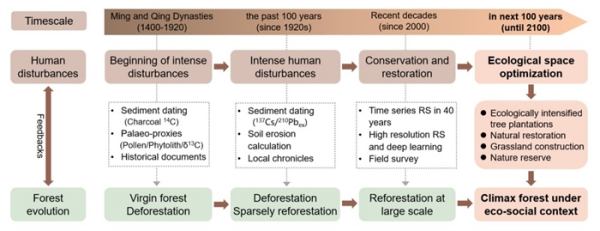
——Guidelines for the establishment of the China Academy of Advanced Science and Technology

——Guidelines for the establishment of the China Academy of Advanced Science and Technology



Currently, large-scale ecological protection and restoration have achieved results in the control of karst rocky desertification in southwestern China. From a natural perspective, the area of rocky desertification in the southwestern karst region has achieved a sustained net reduction, becoming a hot spot for global greening in the past 20 years; The contribution and potential of carbon sequestration in ecological restoration are significant, but differences in rock and soil fabric affect the type and quality of vegetation restoration, especially in terms of soil abundance and mineral nutrients in the soil vegetation system, which constrain the restoration of forest landscapes in some karst areas. From a social perspective, the relationship between people and land in karst areas has shifted from tension to structural equilibrium, and the pressure on rural population and actual population in rural areas has been alleviated; The process of rural development and ecological restoration promotes the transformation of the social ecological system in karst areas, and the relationship between people and land in karst areas has reached a turning point. Under the constraints of geological background, ecological restoration in karst areas faces new challenges such as selecting suitable afforestation sites under different geological environments, improving artificial forest productivity and ecosystem services, and balancing regional greening with economic benefits.
The governance of rocky desertification and the resolution of sustainability issues related to greening require a comprehensive and interdisciplinary research approach, focusing on the core elements of forest degradation and afforestation in karst areas, such as carbonate rock constraints and human disturbances. This study proposes a social ecological research framework to enhance the sustainability of afforestation in karst areas. This framework aims to optimize future ecological construction space by considering different social ecological backgrounds, based on the long-term and continuous interaction and feedback between human activities and different ecosystem elements. The common social ecological system framework often overlooks the impact of historical changes, but this framework integrates long-term human disturbance and forest evolution, defines the continuous time scale social ecological system feedback process, and clarifies the key periods of long-term human disturbance and forest evolution in the southwestern karst region of China, including the beginning period of human disturbance, the strong period of human disturbance, the contemporary protection and restoration period, and the future ecological space optimization period. By using research methods such as sediment analysis, historical literature recording, long-term and high-resolution remote sensing, deep learning, etc., it reconstructs the forest pattern evolution process of "natural forest deforestation reforestation" under human disturbance in the southwestern karst region since the Ming and Qing dynasties, providing a comprehensive and forward-looking strategy to analyze the geological environment constraints. Complex dynamic processes of social ecological systems, This has laid a scientific foundation for optimizing the ecological construction space and implementing precise ecological restoration strategies in the southwestern karst region.
The multifunctionality of this framework can be extended to ecological restoration practices in other ecologically vulnerable areas under different social ecological backgrounds. Combining historical and recent forest dynamics and deforestation processes will enhance scientists' understanding of forest structure and function changes caused by human activities or climate change, and provide evidence to evaluate the degree of regional forest restoration and whether afforestation measures are needed.
The research work has been supported by key projects of the National Natural Science Foundation of China and the National Key Research and Development Plan.
Paper link

A Social Ecological Research Framework Integrating Long Term Human Disturbance and Forest Evolution
Zhongke Frontier(Xiamen)Science and Technology Research Institute©All rights reserved
Service Customer Service:4006 285 158 Postal Code:361006
Address:Science City Zhongke Building,Huangpu District,Guangzhou City
396 Jiahe Road,Huli District,Xiamen City
Website:http://www.zk-yjy.com